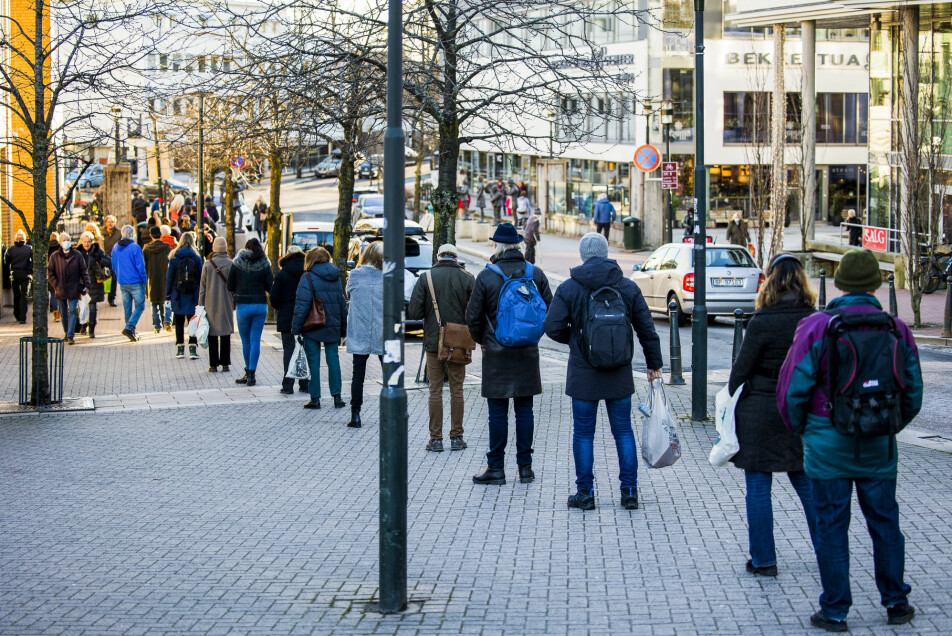
These groups of people drank more alcohol during the pandemic
The most common explanation for drinking more was that they deserved it.
One in three say they drank less alcohol during the pandemic, while only one out of six responded that they drank more, according to a new Norwegian study.
The total consumption of alcohol in Norway neither increased nor decreased during the pandemic, according to this survey.
“Even if more people responded that they drank less, compared to those who responded that they drank more, it would seem that those who previously drank a fair bit have increased their consumption so much that the total level of consumption remains the same”, Jørgen Bramness says to ScienceNorway.no. He is a researcher at the Norwegian National Advisory Unit on Concurrent Substance Abuse and Mental Health Disorders
1200 Norwegians participated in the survey, which was conducted during the summer of 2020.
The researchers conclude that "after the COVID-19 restrictions were implemented, a substantial proportion of Norwegians changed their drinking behaviour."
Those who drank a lot before, now drank more
The first few months of the pandemic did not have any dramatic effects on the general level of alcohol consumption in Norway, according to the new study by Bramness and colleagues.
What they do see however, is that the pandemic led to a more polarized consumption pattern: Those who used to drink quite a lot, drank more. Those who didn’t drink much before, drank even less.
“This polarization is evident particularly among women and youth”, says Bramness.
The researchers found this polarization also among people living in the capital city Oslo, which has been hardest hit by the pandemic.
“This pattern in youth as well as Oslo-folks could be explained by the fact that they have felt the consequences of the pandemic and the infection control measures more acutely. But this is mere speculation”, Bramness says.
When the government tried to close the Wine Monopoly
Hard alcohol in Norway is only sold at Vinmonopolet, the Wine Monopoly, which is wholly state owned. This is part of a social policy which has effectively removed private profit motive from the sales of alcohol.
When the british mutation of the coronavirus caused an outbreak in municipalities surrounding Oslo in January 2021, the Government famously tried to close the Wine Monopolies in these municipalities for the rest of the month.
This led to people travelling in droves to other, neighbouring cities in order to get their fill of wine and spirits, despite being urged to stay put by local and national authorities. The decision caused a massive stir, and the government backtracked. Within days, they reversed the decision to close the Wine Monopoly.

The highly educated, and parents
The highly educated responded that they drank more during the pandemic. The alcohol researchers believe this is connected to the fact that this is a group of people who already had a fairly high consumption level of alcohol.
Highly educated people often drink quite a bit of alcohol, however, it doesn’t have the same serious consequences for them as it perhaps would for other less educated groups of society.
The increase in drinking alcohol among the highly educated could also be connected to the fact that this group of people have been able to work from home to a larger extent than others.
Parents with children still living at home also responded that they drank more during the start of the pandemic. Bramness finds it more difficult to find a good explanation for this phenomenon.
Because they deserved it
Among those who drank less than before during the pandemic, the most commonly given reason was that there were fewer social occasions during which to drink.
The most commonly given reason to drink more was the feeling that one deserved something good and comforting during the hardships of the pandemic. And also that the situation ensured the consequences of the drinking were not so severe, as everything was closed due to corona anyway.
During previous crisis’ in society, a lot of people have cited stress as the most common reason for drinking more. This however was not a prominent reason given in the Covid-19 survey on alcohol consumption.
Who were the hoarders then?
A Swedish survey has looked into who hoarded food and toilet paper during the first few weeks of the pandemic. The Survey, from the University of Gothenburg, found that 22 per cent of Swedes hoarded.
The typical hoarder, according to this study, lives in a larger city, has higher education, and a somewhat higher income than the average levels.
Most of them didn’t hoard because they were afraid the stores would run out of items, but in order to avoid getting infected with the virus.
Researcher Johan Magnus Roos says in a press release that perhaps a higher education as well as financial resources are needed in order to prepare for the future and reduce the risk of being infected. Education and a good economy can lead to both insigts and the ability to act, he believes.
References:
Jørgen Bramness et al: «Alcohol Use during the COVID-19 Pandemic: Self-Reported Changes and Motives for Change», European Addiction Research, 2021. Summary.
Konsumtionsrapporten 2020, Report from the Centre for Consumption Research, University of Gothenburg, 2021
———


































